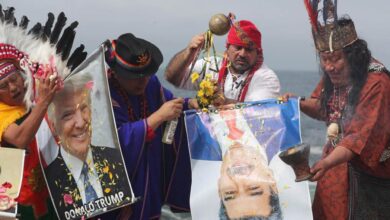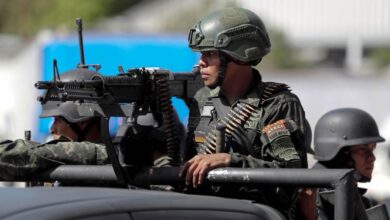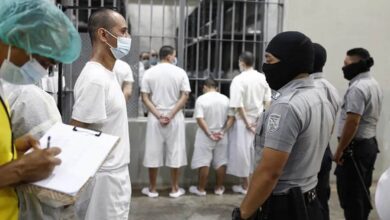How progressive or leftist is the possible new president of Peru?
Pedro Castillo is a politician who is branded a communist but with a past in a party in favor of the free market.

The Peruvian professor who caused a furor in the Inca elections and reached the top position of the nation is a box of surprises. Photo: TW-PedroCastilloTe
LatinAmerican Post | Santiago Gómez Hernández
Listen to this article
Leer en español: ¿Qué tan progresista o izquierdista es el posible nuevo presidente del Perú?
The Peruvian professor who caused a furor in the Inca elections and that is reaching the top position of the nation is a box of surprises. Not only because he can be Peru's first openly socialist president, but he also has a past as a "neoliberal" center.
His more moderate side
In 2002 when he entered politics, he joined the Peru Posible party of former President Alejandro Toledo (today required in extradition for corruption). The Toledo party, and the former president himself, called themselves center-left, with a neoliberal economic model but with a distribution of wealth based on a welfare state.
However, since 2020, Castillo has entered Peru Libre, a party far away on the political spectrum towards Marxism. Even its leader and founder Vladimir Cerrón, accused of corruption and controversial for his support for questioned governments in the region such as Venezuela and Cuba.
You may also be interested in: Peru: Fujimorism vs Socialism of the XXI Century?
Castillo assures that he does not identify with any other movement in the region. He stands out from the figure of Cerrón and during the campaign of second round, he tried to moderate his speech to attract the undecided votes that he was fighting with the right-wing Keiko Fujimori. However, he has not been critical of the Chavista regime either.
The possible new president also reassured international markets by committing to continue paying the foreign debt and the independence of the Central Bank. "We will maintain an open and broad dialogue with various business sectors and honest businessmen who play a fundamental role in the industrialization and development of the country."
His most extreme proposals
Castillo gained national visibility during 2017, amid protests against the Government of Pedro Pablo Kuczynski. He took advantage of the chaos and the loss of prestige of the Peruvian political class and came to power as an outsider, a man close to the people who live in a humble house in the north of the country.
Pedro Castillo solo sabe de comunismo, solo tiene como lenguaje expropiar #NoAlComunismo pic.twitter.com/Y4Bpqzkt8s
— Datos y datitos (@DDatitos) April 26, 2021
Although he refuses to be a Marxist, several analysts and media call him an extremist. He threatened Congress if it does not accept a Constitutional Assembly to change the Magna Carta of Peru that has been in force since 1993, born during the Fujimori dictatorship.
#EligeBienEl economista Carlos Palomino Selem, miembro del equipo técnico de Perú Libre, descartó que la propuesta de Pedro Castillo de eliminar las AFP consista en expropiar o intervenir en el tema previsional.
Video completo aquí: https://t.co/trnRDnW8Vh pic.twitter.com/pIsJf0rneB
— Exitosa Noticias (@exitosape) May 28, 2021
He is in favor of "regulating the media" and increasing spending on education, even to figures that are unrealistic. In addition, it has declared war against the Free Trade Agreements and with foreign companies operating in Peru. The politician from Peru Libre intends to increase the contribution of the multinationals or threatens to, what he calls, "nationalize." "In some cases, the only nationalization should be used and not nationalization, compensating the private for what was invested and managing the total profits generated," he writes in his government plan. He is also accused of being a populist by promising to keep his salary as a teacher and to reduce the salary of congressmen.
A very conservative leftist
The figure of Castillo divides within the Latin American and global left. At a time when socialism has influenced and re-empowered itself with the LGBT and feminist movements, Castillo's positions clash against these new currents. Perhaps the closest candidate to these visions in the Peruvian elections was Verónika Orozco (Together for Peru), who was left out in the first round.
On more than one occasion, the possible new president of Peru has stated that in a personal way he is against equal marriage, euthanasia, abortion, and the legalization of recreational marijuana. Many of these positions would make him a serious candidate for any conservative party, but he appears on the other side of the economic spectrum.
#Peru en comparación con KF, #PedroCastillo es la mejor opción, sus declaraciones…????
-¿Legalizaría el aborto?
-Absolutamente no.
¿Eutanasia?
-Tampoco estoy de acuerdo.
¿Matrimonio igualitario ?
-Aún peor….la familia primero.
¿Legalizar la marihuana ?
-Por supuesto que no. pic.twitter.com/mlOIysnkY5— Marcelina Romero (@lmarcelinaromer) June 8, 2021
However, he does not rule out passing these proposals to Congress for a decision in the legislature. Additionally, his party does support proposals such as legal abortion as a birth control measure.
To this is also added his idea of reforming the constitution and allowing the death penalty. And, above all, his xenophobic discourse of expelling "foreigners" who commit crimes, stigmatizing the already discriminated Venezuelan community in Peru.




